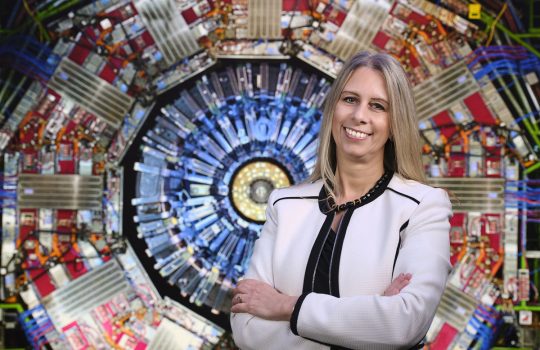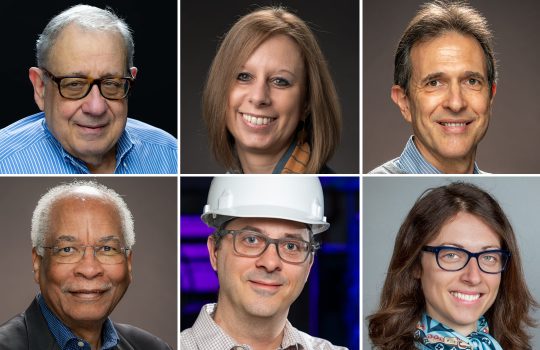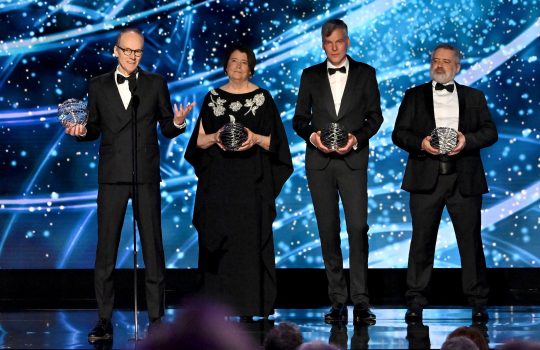Batavia, Ill.—The U.S. Department of Energy has named the U.S. Compact Muon Solenoid detector project as a recipient of the DOE Secretary’s Award for Achievement. DOE presents the awards to management teams that demonstrate significant results in completing projects within cost and schedule. Fermilab physicist Dan Green will accept the award on behalf of the U.S. CMS collaboration on March 31, at the 2009 Annual DOE Project Management Workshop in Alexandria, Virginia.
The U.S. CMS collaboration will share the award for the detector project with the U.S. ATLAS collaboration. The projects provide a unique opportunity for U.S. scientists to participate in the largest collaborative effort ever attempted in the physical sciences. Fermi National Accelerator Laboratory serves as the host laboratory for the U.S. CMS project. Brookhaven National Laboratory hosts the U.S. ATLAS project. Scientists from U.S. universities and national laboratories contributed key components and expertise to the state-of-the-art detectors built for the Large Hadron Collider at CERN, the European laboratory for particle physics, in Geneva, Switzerland.
“This award is a tribute to the entire U.S. CMS collaboration,” said Green, who currently serves as the CMS Collaboration board chair. “It recognizes the team efforts of more than 700 scientists who built one-third of the detector on time and on budget.
CMS has approximately 2,300 international collaborators. Supported by the DOE Office of Science and the National Science Foundation, the U.S. CMS collaboration consists of roughly 420 Ph.D. physicists, over 100 graduate students and nearly 200 engineers, technicians, and computer scientists from 48 U.S. universities and Fermilab. The U.S. is the largest single national group in the experiment.
“I congratulate Fermilab and Dan Green on effectively managing the U.S. CMS detector project,” said Pepin Carolan, who served as DOE Federal Project Director for U.S. CMS and U.S. ATLAS. “Both U.S. ATLAS and U.S. CMS play a critical role in training future generations of scientists to maintain U.S. leadership in science, technology and innovation.”
Notes for editors:
Press kits are available at:
http://www.uscms.org/public_2/about/press_kit/index.shtml
The United States contributions to the CMS experiment and the Large Hadron Collider are funded by the Department of Energy’s Office of Science and the National Science Foundation.
CERN is the European Organization for Nuclear Research, with headquarters in Geneva, Switzerland. At present, its Member States are Austria, Belgium, Bulgaria, the Czech Republic, Denmark, Finland, France, Germany, Greece, Hungary, Italy, Netherlands, Norway, Poland, Portugal, Slovakia, Spain, Sweden, Switzerland and the United Kingdom. India, Israel, Japan, the Russian Federation, the United States of America, Turkey, the European Commission and UNESCO have Observer status.
Fermi National Accelerator Laboratory is the host laboratory for the US CMS Collaboration. Fermilab is a Department of Energy National Laboratory operated under a contract with DOE by the Fermi Research Alliance for the DOE Office of Science.
U.S. CMS member institutions
(48 institutions, from 23 states and Puerto Rico)
California
California Institute of Technology, Pasadena
Lawrence Livermore National Laboratory, Livermore
University of California, Davis
University of California, Los Angeles
University of California, Riverside
University of California, San Diego
University of California, Santa Barbara
Colorado
University of Colorado, Boulder
Connecticut
Fairfield University, Fairfield
Florida
Florida Institute of Technology, Melbourne
Florida International University, Miami
Florida State University, Tallahassee
University of Florida, Gainesville
Illinois
Fermi National Accelerator Laboratory, Batavia
Northwestern University, Evanston
University of Illinois at Chicago
Indiana
Purdue University, West Lafayette
Purdue University Calumet, Hammond
University of Notre Dame, Notre Dame
Iowa
University of Iowa, Iowa City
Kansas
Kansas State University, Manhattan
University of Kansas, Lawrence
Maryland
Johns Hopkins University, Baltimore
University of Maryland, College Park
Massachusetts
Boston University, Boston
Massachusetts Institute of Technology, Cambridge
Northeastern University, Boston
Michigan
Wayne State University, Detroit
Minnesota
University of Minnesota, Minneapolis
Mississippi
University of Mississippi, Oxford
Nebraska
University of Nebraska, Lincoln
New Jersey
Princeton University, Princeton
Rutgers, The State University of New Jersey, Piscataway
New York
Cornell University, Ithaca
Rockefeller University, New York
State University of New York at Buffalo
University of Rochester, Rochester
Ohio
Ohio State University, Columbus
Pennsylvania
Carnegie Mellon University, Pittsburgh
Puerto Rico
University of Puerto Rico, Mayaguez
Rhode Island
Brown University, Providence
Tennessee
University of Tennessee, Knoxville
Vanderbilt University, Nashville
Texas
Rice University, Houston
Texas A&M University, College Station
Texas Tech University, Lubbock
Virginia
University of Virginia, Charlottesville
Wisconsin
University of Wisconsin-Madison



